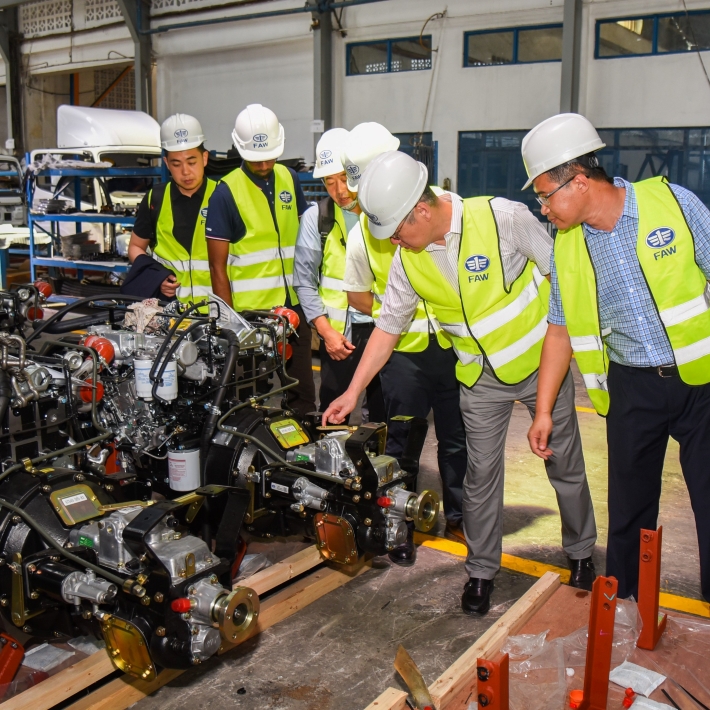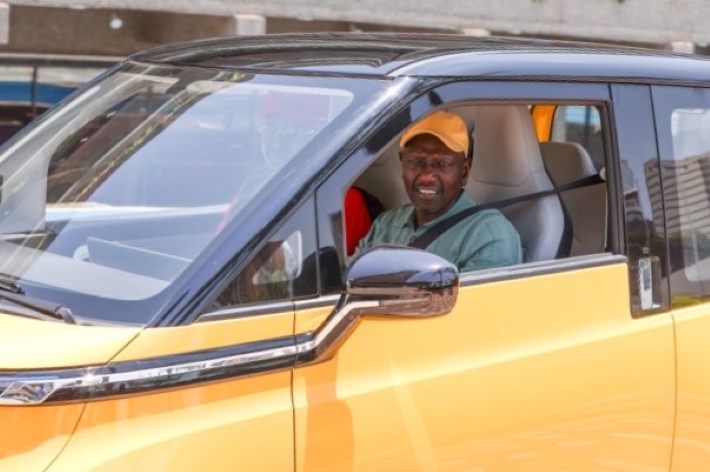|
||||||||||
| Home Nation World Business Opinion Lifestyle ChinAfrica Multimedia Columnists Documents Special Reports |
|
||||||||||
| Home Nation World Business Opinion Lifestyle ChinAfrica Multimedia Columnists Documents Special Reports |
| ChinAfrica |
| Making a Mark |
| Chinese electric vehicles assembled in Kenya attracting consumers, as the country gets serious about green energy goals |
| By Gitonga Njeru | VOL. 16 June 2024 ·2024-06-11 |

FAW staff visit an assembly plant in Kenya (TRANSAFRICA MOTORS LTD)
David Njagi is a taxi driver based in Nairobi, Kenya. He recently changed his regular diesel engine taxi for a Chinese-made electric vehicle (EV), a trend being followed by many Kenyans looking to save on the high costs associated with fossil fuels and making transport more sustainable.
Niagi decided to use his private vehicle as a self-employed taxi driver for the Bolt (European ridesharing app) to earn an income after he was laid off from his job as an accountant at the Coca-Cola. His EV is convenient and a cost saver.
“I own a Chinese model EV. It is extremely durable. It can travel long distances as the electric charge lasts for several hours. So apart from saving money, I make at least 80 percent more profit than I did on my previous diesel vehicle,” said Njagi.
Building his own dream
Niagi’s Chinese EV brand is a BYD Dolphin. It is assembled in Kenya by the Association of Vehicle Assemblers (AVA).
“When fully charged, my car can travel slightly over 400 km. There are designated charging piles in different parts of Nairobi for all electric and solar cars and some people are lucky enough to charge in the comfort of their homes,” he said, adding that it takes approximately 90 minutes to fully charge his car.
“It reaches 80 percent in 50 minutes, but it depends on the type of charger I use. A 6.6-w charger is the best alternative for this type of model. It costs me 1,000 shillings ($7.5) for the entire charge,” said Niagi.
The price of his car was about 3.4 million shillings ($25,757). According to AVA, the spare parts for Chinese electric cars are available locally. The government plans to reduce value-added tax on the cars and spare parts, making them cheaper in time.
“Technology makes my taxi business easier as I can get customers almost every hour of my long workdays [via an app],” said Njagi. “I not only offer taxi services online, but also deliver food, groceries and drinks - both alcoholic and non-alcoholic. It’s a good business as being online you cannot miss customers.”
The father of two said his taxi work allows him to pay for his monthly bills comfortably, including schooling for his young children.
Local EV assembly
Alex Wachira, principal secretary in the Ministry of Energy and Petroleum, said in Nairobi on 24 April that Chinese EVs have emerged as a viable alternative to traditional fossil fuel-based automobiles.
“I want to congratulate all the Chinese firms with local assembly operations because they have played a role in increasing the uptake of EVs in the country.”
Wachira was addressing the second edition of the Kenya Power E-Mobility Conference. The two-day conference brought together more than 200 delegates, including government officials, donors, and e-mobility experts from across the globe, to review innovative and transformative solutions to decarbonise the transport sector.
Meanwhile, Kenya began assembling Chinese EV brands last year. Apart from AVA, small local start-ups are also assembling EVs. Part of the motivation is attributed to the country wanting to venture into more sustainable transport.
“Some of the new government policies on sustainable transport, and more particularly on green energy, have led to greater economic opportunities for many. In fact, a lot of the EVs on the roads are Chinese brands. They are very durable and the demand for the BYD brand is high. We hope to double production this year on our assembly lines,” Matt Lloyd, managing director of AVA, told ChinAfrica.
“As AVA Kenya, we account for over 65 percent of all vehicles assembled in Kenya. We produced a total of 156,089 cars last year (all brands and fuels). We aim to increase total output this year, as Chinese EV brands increase with market demands. At the time a customer orders directly that they want a BYD or Tesla brand, we immediately begin to assemble,” said Lloyd, adding that they assembled 102 BYD EVs last year.
According to Lloyd, AVA had a target of 130 BYD electric cars, and although they fell short, he is optimistic that they are on track. Some notable models assembled by AVA include BYD Seal, BYD Atto 3, BYD Dolphin and BYD e6.
“We also have high end Tesla brands that are assembled locally, but in small numbers. Their demand is however still growing. The prices are as high as $66,000 and are for the high-end market, mostly the upper middle class,” added Lloyd. But he confirms there is a potential to assemble about 550 Chinese EVs before the end of this year.
“Basically, the demand for EVs has been on a steady rise. Sixty percent of Chinese brands are already in the market,” said Lloyd.
Hezbon Mose, chair of the Electric Mobility Association of Kenya, told Xinhua there are currently about 40 companies selling electric bicycles and vehicles due to the rising demand for green transport.
“The majority of these EVs source their components from China because they offer competitive pricing,” said Mose. He noted that there are about 10,000 electric bicycles and vehicles in the country, and the figure is expected to pass the 20,000 mark by the end of 2024.

Kenyan President William Ruto drives a locally assembled electrical vehicle in Nairobi, Kenya, on 3 September 2023 (WILLIAM RUTO X ACCOUNT)
Kenya’s green energy ambitions
Chinese vehicles from the FAW Group and SAIC Motor are also already being assembled by AVA. The automobile companies make high quality vehicles and have been in the Kenyan market since 2013.
“FAW ranks third in production and sales are right behind Toyota and Nissan. SAIC comes in fourth. They are in high demand - more than many European brands that have dominated the market for decades,” said Lloyd.
In the process of its green efforts, Kenya is a signatory to the Paris Agreement reached at the UN Climate Change Conference of 2015. The country hopes to reduce temperature increases by 1.5 degrees Celsius by 2030.
“We hope to cut carbon emissions through the use of green energy. Already, Kenya has invested heavily in green energy. For example, 83 percent of our electricity is from renewables. Chinese EVs are known to be more durable than many brands. They last longer after being charged and can travel a few hundred km on a single charge,” said Davis Chirchir, cabinet secretary for energy and petroleum in Kenya.
A growing number of the brands also come with a solar panel as an alternative to electricity charging.
According to Seble Samuel, head of Africa campaigns and advocacy for the Fossil Fuel Non-Proliferation Treaty Initiative, Kenya is already leading in a push for a fossil fuel treaty globally. She said that a new treaty will see Kenya increase the use of renewable energy globally.
“Apart from the proposed Fossil Fuel Non-Proliferation Treaty Initiative opposing use of fossils, it will also discourage the exploration and usage. A new treaty will see more research and technology initiatives put into new use to exploit renewable energy sources,” said Samuel.
“One way or another, a new treaty will make sustainable transport even more available on our roads. Kenya is already a leader in sustainable transport after South Africa and Nigeria in Africa,” said Soipan Tuya, cabinet secretary at the Ministry of Environment, Climate Change and Forestry.
|
||||||||||||
| About Us | Contact Us | Advertise with Us | Subscribe |
| Copyright Beijing Review All rights reserved 京ICP备08005356号-5 京公网安备110102005860号 |